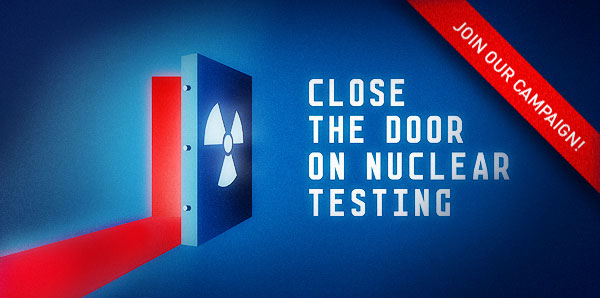
American diplomat Richard Rush once said that "time" was "the best negotiator." Time may also have convinced Iran that it's just not worth it to pursue a nuclear weapons program." Iran's actions in the coming months will tell the tale of course.
While pursuing a resolution to Iran's nuclear program, it's also time for another key action on the road to peace: ratifying the Comprehensive Nuclear Test Ban Treaty (CTBT). This treaty bans all nuclear test explosions. For the treaty to take effect the U.S., Iran, China, India, Pakistan, Egypt, Israel and North Korea need to ratify it.
The United States does not need to do test explosions any longer. The last U.S. underground nuclear test explosion was in 1992. The 1963 Limited Test Ban Treaty had already eliminated nuclear testing in the atmosphere, underwater and in outer space.
The United States wants to avoid a costly and dangerous arms race with Russia and China. A return to nuclear test explosions would certainly set this off. The Center for Arms Control and Non-Proliferation says, "China is very likely to ratify the CTBT after the U.S. does." Russia has already ratified the treaty. Russia has said it will continue a voluntary nuclear-testing moratorium, "as long as other Nuclear Weapons States do the same."
The U.S. does not want to see India and Pakistan continue their nuclear arms and missile buildup. North Korea's three nuclear tests, conducted while its population suffers in hunger, show the insanity of these weapons and ultimately how useless and wasteful they are. No one wants to follow their example.
The world needs to stand united against nuclear weapons and finishing the job on the CTBT is a strong and relatively simple place to start.
The expensive burden of nuclear weapons and the threat of nuclear terrorism, make disarmament a vital goal for all nations. The group Global Zero says, "nuclear-armed states will spend, conservatively estimated, at least one trillion dollars on nuclear weapons and their direct support systems over the next decade." All these dollars come at the expense of social programs including feeding the hungry.
Banning nuke testing can set the conditions for these global nuclear arms reductions and cost-cutting. The Canberra Commission for the Elimination of Nuclear Weapons said in 1995, "the CTBT obligation permanently to cease or forgo nuclear testing sets the psychological stage for moving toward elimination of nuclear weapons."
Iran should ratify the treaty, as Iraq did at the end of September. Iraq faced years of sanctions for its pursuit of weapons of mass destruction. Iraq's foreign minister said, "As a result of this suffering... Iraq is keen to contribute to global efforts to enhance an international system for disarmament and the non-proliferation of WMD... it is vital for the sake of security in the region that all of the States in the Middle East ratify the CTBT."
Iran's economy is suffering through sanctions. Investments poured into their nuclear complex are at the expense of their citizens. Heavy bills and constant international tension, not to mention the threat of attack, do not make for a sound government policy.
This reality coupled with last month's events at the UN General Assembly bring hope and opportunity for nuclear security and peace in the Middle East. President Obama said after speaking with President Rouhani, "We're mindful of all the challenges ahead. The very fact that this was the first communication between an American and Iranian President since 1979 underscores the deep mistrust between our countries, but it also indicates the prospect of moving beyond that difficult history."
So this potential diplomatic opening can hopefully resolve the Iranian nuclear crisis. It can also serve as an opportunity to further nuclear non-proliferation efforts worldwide. The best place to start is by closing the door on nuclear testing forever and ratifying the Comprehensive Nuclear Test Ban Treaty (CTBT).
